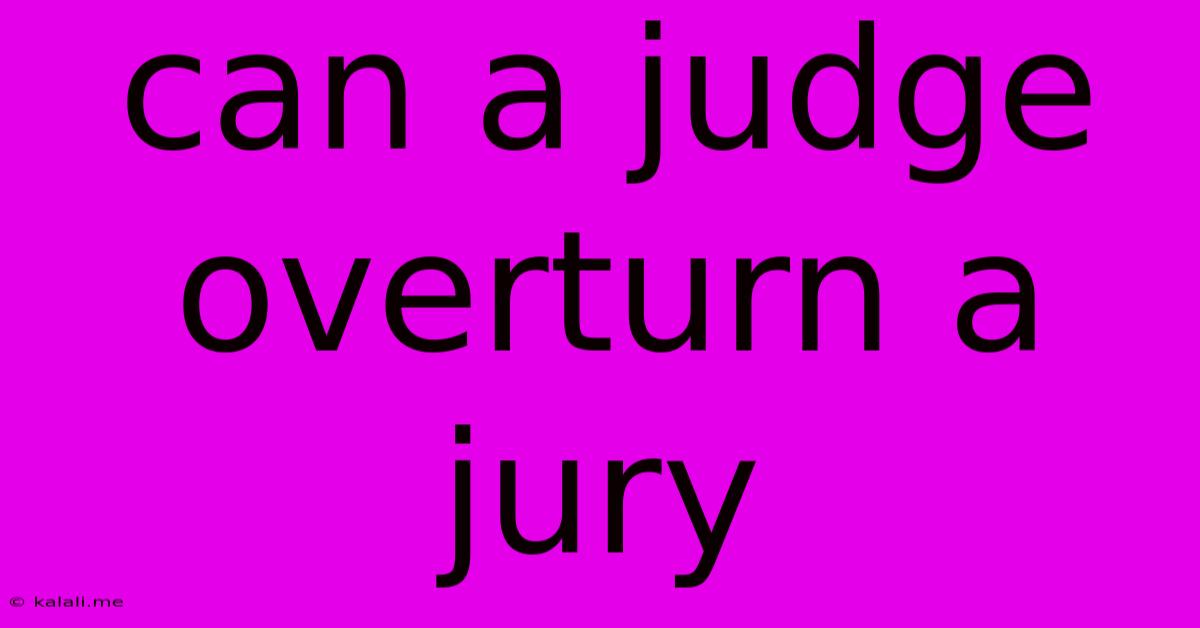Can A Judge Overturn A Jury
Kalali
May 21, 2025 · 3 min read

Table of Contents
Can a Judge Overturn a Jury Verdict? Understanding Judicial Oversight in the Courtroom
The power of a jury to decide the facts of a case is a cornerstone of many legal systems, embodying the principle of trial by one's peers. However, this power isn't absolute. The question, "Can a judge overturn a jury verdict?" is nuanced, and the answer depends on several factors, including the type of trial, the specific grounds for the judge's intervention, and the applicable laws of the jurisdiction. This article explores the circumstances under which a judge might overturn, or more accurately, set aside, a jury's verdict.
Understanding the Roles of Judge and Jury
Before delving into the circumstances where a judge might intervene, it's crucial to understand the distinct roles of judge and jury. The jury is responsible for determining the facts of the case—who did what, when, and why. They weigh the evidence presented by both sides and reach a verdict based on their interpretation of the facts. The judge, on the other hand, ensures the trial proceeds fairly and according to the law. They rule on legal matters, such as the admissibility of evidence, and instruct the jury on the applicable law.
Grounds for Overruling a Jury Verdict
A judge cannot simply overturn a jury verdict because they disagree with it. The judge's power is limited to specific legal grounds. These typically include:
-
Insufficient Evidence: If the judge believes there is insufficient evidence to support the jury's verdict, they may set it aside. This is a high bar; the judge must determine that no reasonable jury could have reached the same conclusion based on the evidence presented. This often involves a motion for judgment notwithstanding the verdict (JNOV) or a motion for a new trial.
-
Jury Misconduct: If the jury engaged in misconduct that affected the fairness of the trial—such as considering outside evidence, being improperly influenced, or failing to follow the judge's instructions—the judge may overturn the verdict. Examples of misconduct could include juror bias discovered after the verdict or evidence of outside influence on deliberations.
-
Errors of Law: If the judge made a significant error of law during the trial that likely influenced the jury's verdict, they may set aside the verdict and order a new trial. Such errors could involve the incorrect admission or exclusion of evidence or misinstructing the jury on the applicable law. This would typically involve appeals and subsequent review by higher courts.
-
Excessive or Inadequate Damages: In civil cases, if the judge believes the jury awarded damages that are grossly excessive or inadequate, they may order a new trial or remit the damages to a more reasonable amount. This is often a matter of considerable discretion on the judge's part, considering relevant case law and precedent.
The Process of Overruling a Verdict
The process for a judge overturning a jury verdict typically involves post-trial motions. These motions are filed by one party after the jury returns its verdict and request that the judge take some action, such as setting aside the verdict or ordering a new trial. The opposing party then has an opportunity to respond. The judge then reviews the arguments and the evidence and decides whether to grant the motion. The decision can be appealed to a higher court.
Conclusion
While the jury holds significant power in determining the facts of a case, a judge retains the authority to intervene under specific circumstances. This oversight is crucial in maintaining fairness and upholding the integrity of the legal process. However, the power to overturn a jury verdict is carefully circumscribed by law and is only exercised in exceptional situations where serious legal errors or procedural irregularities have occurred. The judge's role is to ensure that justice is served, even if it means reviewing and potentially correcting a jury's decision. It's important to remember that this intervention is not about substituting the judge's judgment for that of the jury, but about ensuring a just and fair trial outcome.
Latest Posts
Latest Posts
-
Eyesight Requirements To Be A Pilot
May 21, 2025
-
How To Keep Spiders Out Of Garden Shed
May 21, 2025
-
Why Does Messenger Show Active When You Re Not
May 21, 2025
-
Does Joker Die In Suicide Squad
May 21, 2025
-
How Many Items Can Coal Smelt
May 21, 2025
Related Post
Thank you for visiting our website which covers about Can A Judge Overturn A Jury . We hope the information provided has been useful to you. Feel free to contact us if you have any questions or need further assistance. See you next time and don't miss to bookmark.